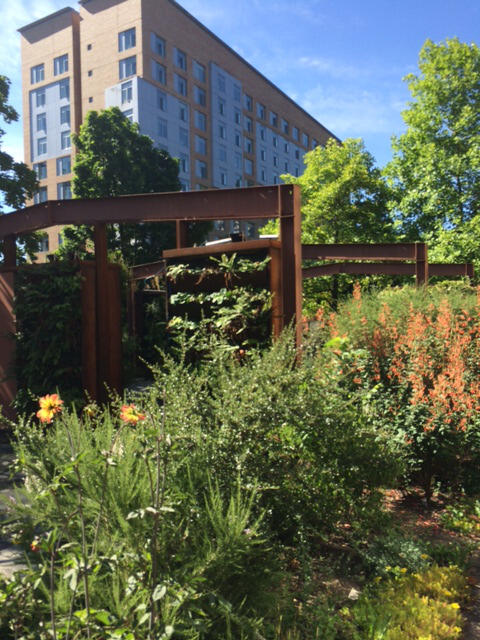July 17, 2015
Tips gleaned from Portland trip influence plans for new community garden
Share this story
Hasan Alkhairo and Alexandra Little recently returned from Portland, Oregon, an urban city where a modern food problem is being combated in an old-fashioned way. Parts of the city are considered food deserts, areas without ready access to supermarkets. Residents in those areas, which are typically low-income neighborhoods, must travel to other parts of the city to locate healthy eating options, such as fresh produce and whole foods.
In response, two higher education institutions in Portland have created community learning gardens that grow large amounts of food in a small space for the benefit of the local community while also providing opportunities for experiential education.
Virginia Commonwealth University already houses such a community learning garden on its MCV Campus. Thanks to the tips and knowledge Alkhairo and Little brought back with them, the university plans a second garden, this one on the Monroe Park Campus, by the end of the year.

The MCV Community Garden on VCU’s medical campus has two beds devoted to growing produce, which is then donated to local organizations, and the rest of the plots are rented to people within the university and community. The garden was started through the efforts of a student organization, Green Unity.
“Gardening and promoting biodiversity was a huge interest for me,” said Little, a VCU alumnus, who was a part of Green Unity as a student. “VCU was really supportive and we built the garden in March of 2012, and I was hired as manager that summer.” She is now the community garden coordinator for both campuses.
Alkhairo, a bioinformatics student in the Center for the Study of Biological Complexity, works with the VCU Office of Sustainability as an intern. He was looking for a project focused on volunteer programming that would allow him to travel to see the work other schools have done. With a boost from Lynn Pelco, Ph.D., VCU’s vice provost of community engagement, he contacted Little and they wrote the proposal that won them a VCU Undergraduate Research Opportunities Program fellowship grant that helped fund the Portland trip.
Last year, during VCU’s annual Campus Sustainability Day, the Office of Sustainability distributed a survey asking students if a garden on the Monroe Park Campus would interest them, and if they would volunteer to work there. The responses were overwhelmingly positive, and, with the support of other student organizations, the project gained steam. By creating a plan that harnessed the support the MCV Campus garden had within the university, and by finding help from the community, Alkhairo and Little were able to secure a Council for Community Engagement grant to help fund the garden’s creation.

The Monroe Park Community Garden will be a high-output garden and its produce will be split between VCU’s RamPantry and the Center for High Blood Pressure in Richmond.
The center plans to incentivize patients to attend workshops by providing them the produce at the event and teaching them how to cook it.
“They seemed so excited to work with us,” Alkhairo said. “It seemed like they were waiting for somebody to come to them with this idea. I hope this is the birth of a whole new era of collaboration between clinics and VCU.”
The Office of Sustainability is also partnering with other groups within the university and surrounding community, including the Community Food Collaborative, the VCU School of Pharmacy and student organizations Green Unity and Verde.
“[People] in the community are interested in visiting, growing produce at VCU and attending community-affiliated classes in the gardens,” said Erin Stanforth, VCU’s director of sustainability. “The response to the gardens has been extremely positive both from the surrounding communities and internally at VCU.”
Stanforth, who previously worked as sustainability manager at Portland Community College, noticed the similarities between VCU and PCC, as well as with Portland State University. All three are landlocked, deal with urban environments and have high demands for gardens without the space to build them. Despite those challenges, both spaces in Portland have managed to create large gardens that have done wonders for their communities.
It’s a learning space, it’s not a place for perfection. It’s a place where everyone can experiment, learn and grow.
In addition to help from the Undergraduate Research Opportunities Program, the trip was funded through the Council for Community Engagement and the Office of Sustainability. During their time in Portland, Little and Alkhairo interviewed sustainability program coordinators at both campuses, surveyed the student volunteers, toured the gardens and even spent some time working in the gardens at Portland State.
With the knowledge gained from the trip, and with help from the new garden’s partners, the duo hopes to put together an action plan to help other community organizations assess their circumstances and develop their own programs. In addition, they plan to expand their volunteer efforts and possibly expand their work at the gardens into professional development for the student volunteers.
“Mindset-wise, they had a lot of good ideas about making the gardens a welcoming space,” Little said. “It’s a learning space, it’s not a place for perfection. It’s a place where everyone can experiment, learn and grow.”
Subscribe to the weekly VCU News email newsletter athttp://newsletter.news.vcu.edu/ and receive a selection of stories, videos, photos, news clips and event listings in your inbox everyThursday.
Subscribe to VCU News
Subscribe to VCU News at newsletter.vcu.edu and receive a selection of stories, videos, photos, news clips and event listings in your inbox.










